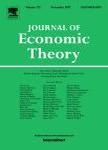-
作者:Schummer, J
作者单位:Northwestern University
摘要:We consider allocation rules that choose outcomes and transfers, based on agents' reported valuations of the outcomes. A bribing situation exists when one agent could pay another to misreport his valuations, resulting in a net gain to both. A bribe-proof rule eliminates such opportunities. We show that under a bribe-proof rule, each agent's payoff is a continuous function of other agents' reported valuations. Furthermore, on connected domains, if the set of outcomes is finite or the domain is ...
-
作者:Yates, AJ
作者单位:Tulane University
摘要:Using a stylized model of the used car market, we extend the formal theory, of the Austrian market process in three directions. First, we incorporate the knowledge problem and entrepreneurial alertness for the discovery of previously unknown information. Second, we allow for the possibility that entrepreneurs may make mistakes. Third, we describe the effect of entrepreneurial behavior on dis-equilibrium market adjustment. We give conditions under which an equilibrium exists for an Austrian mar...
-
作者:Dumas, B; Uppal, R; Wang, T
作者单位:INSEAD Business School; University of Pennsylvania; National Bureau of Economic Research; Center for Economic & Policy Research (CEPR); University of Pennsylvania; University of British Columbia
摘要:In this article, our objective is to determine efficient allocations in economies with multiple agents having recursive, non-time-additive utility functions. Our main result is to show that in a multi-agent economy, the problem of determining efficient allocations can be characterized in terms of a single value function (that of a social planner), rather than multiple functions (one for each investor), as has been proposed thus far (D. Duffie et al., 1994, J. Math. Econ. 23, 133-146). We then ...
-
作者:Che, YK; Gale, I
作者单位:University of Wisconsin System; University of Wisconsin Madison; Georgetown University
摘要:This paper finds an optimal mechanism for selling a good to a buyer who may be budget-constrained. We consider a seller with one unit of a good facing a buyer with ic quasilinear utility function. If the buyer does not face a binding budget constraint, textbook monopoly pricing is optimal. By contrast, the possibility of a binding budget constraint can make it optimal for the seller to use nonlinear pricing, to commit to a declining price sequence, to require the buyer to disclose his budget. ...
